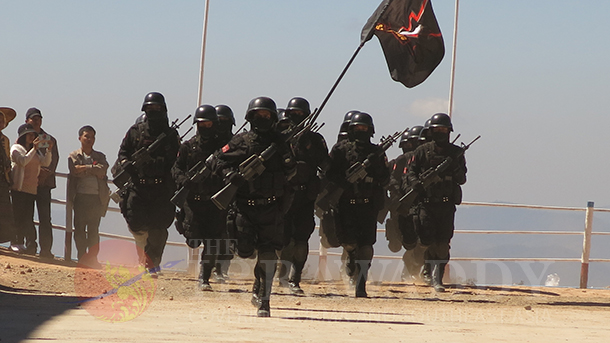Government peace negotiators have told Shan leaders that once-outlawed ethnic armed groups would be removed from its list of “unlawful associations” after signing a nationwide ceasefire agreement.
President’s Office Minister Aung Min dangled that carrot in front of Restoration Council of Shan State (RCSS) leaders at a meeting on Thursday in Thailand, according to Col. Sai La, the RCSS spokesman.
“We discussed the signing of the nationwide ceasefire agreement quickly and collaborating for the initiation of political dialogue before the 2015 general election,” he added.
“They [government representatives] said they would attempt to remove us from the list of outlawed associations after we sign the nationwide ceasefire agreement in August,” Sai La told The Irrawaddy.
The Unlawful Association Act was used by the former military regime to punish any group or individual involved with insurgents. It outlaws any connection with, support for or participation with associations listed by the government as illegal.
The act, which has largely been allowed to lapse as the government has engaged with Burma’s many ethnic armed rebel groups, has still occasionally been used by President Thein Sein’s reformist government to imprison people based on their alleged affiliation with rebel groups. Last year in May, the RCSS called on the government to amend the act, which it said was hindering the peace process.
Shan negotiators, led by Lt-Gen Yawd Serk, did not reach any breakthrough agreements with their government counterparts on Thursday in northern Thailand’s Chiang Saen, according to the RCSS spokesman.
“We talked about rebuilding mutual trust and understanding at the ground level to overcome the misunderstandings and problems at the grassroots level,” he said, referring to a May raid on the RCSS liaison office in Kengtung, Shan State.
Tensions were high last month after soldiers from the government’s military intelligence unit, police officers and township authorities raided the RCSS office without notice. A few weeks later, the RCSS vowed it would “continue the armed struggle” to achieve its political aims if left with no other choice, in a statement marking the 56th anniversary of Shan State People’s Resistance Day.
Relations appear to have warmed since then.
The RCSS, which is not a member of the Nationwide Ceasefire Coordination Team (NCCT), said it would join the next meeting between the NCCT and the Union Peace Working Committee.
The NCCT and UPWC met last month, hoping to agree to a single text on the nationwide ceasefire agreement. The government has said it wants a signing to take place by August, but no official date has been set.
Ethnic leaders say they would meet for a third ethnic armed groups conference in July, ahead of a planned meeting with government representatives. The first and second conferences were held in Laiza, Kachin State, and Law Khee Lar, Karen State, in October 2013 and January 2014, respectively.
Most of Burma’s major ethnic armed groups have signed bilateral ceasefires with the central government, but the Kachin Independence Army (KIA) and the Ta’ang National Liberation Army (TNLA) have yet to do so. Clashes between the two ethnic armed groups and government troops are still a regular occurrence in northern Burma.

















